Rising star Kasper Asgreen 'not scared' of taking on big name rivals
Dane on his rapid ascent through the ranks at Deceuninck-QuickStep
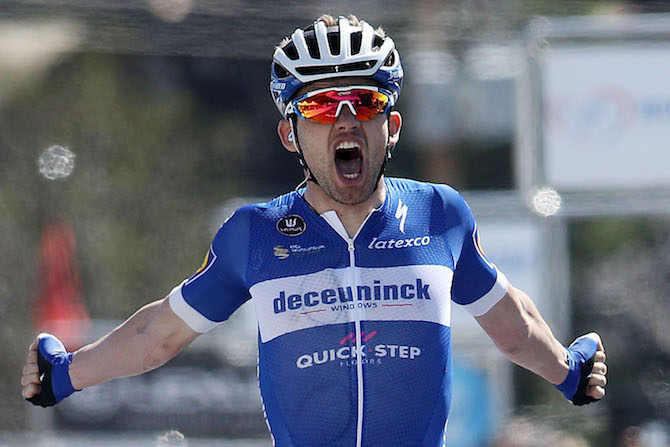
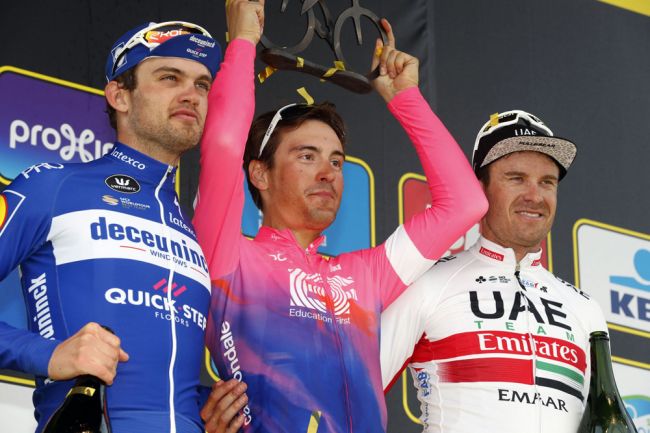
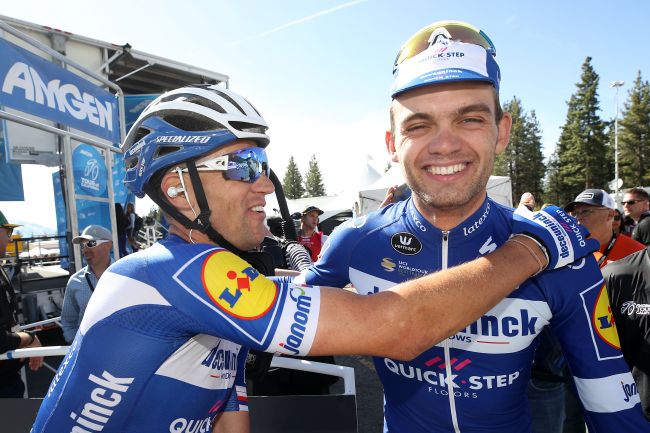
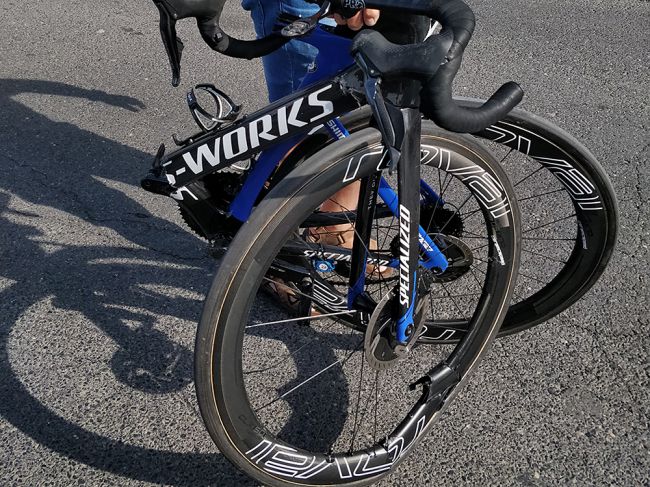
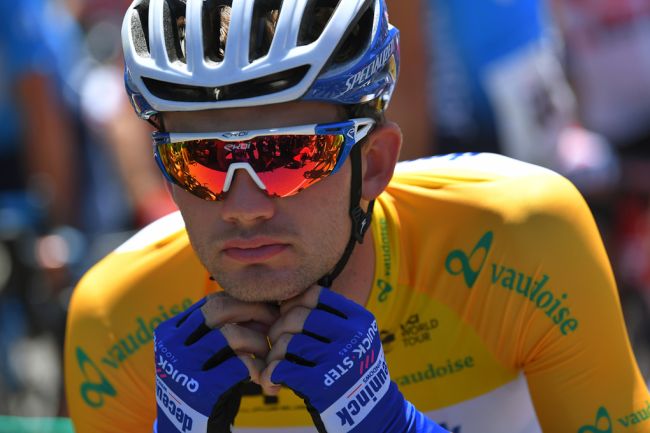
Deceuninck-QuickStep’s press conference ahead of this year’s Tour of Flanders followed a format familiar from the days of Johan Museeuw and Tom Boonen. On the Friday afternoon before the race, a critical mass of journalists squeezed into a sponsor’s showroom – on this occasion, Deceuninck’s headquarters in Hooglede – and the seven-man selection for the Ronde filed onto a makeshift stage.
Once the perfunctory presentation ended, rolling mauls of television cameras and microphones quickly formed around Philippe Gilbert, Bob Jungels, Zdenek Stybar and Yves Lampaert, the team’s quadrumvirate of leaders. Tim Declercq and Iljo Keisse did brisk trade, too, as reporters turned to the team’s Flemish strongmen for their insight into the vagaries of the Ronde. Team manager Patrick Lefevere, glass of wine in hand, held court as ever with a sizeable group in the corridor.
The media obligations facing Ronde debutant Kasper Asgreen were rather less onerous. The Dane was flatly ignored by the international media on hand in Hooglede, although he at least had the company of a fellow countryman as he waited until his teammates were ready to leave.
“One interview. One Danish journalist,” Asgreen deadpans, then bursts out laughing. “There was one.”
Forty-eight hours later, in the market square in Oudenaarde, Asgreen’s more illustrious teammates were the ones waiting for him to finish his media duties. With Deceuninck-QuickStep’s leaders misfiring, it was the neophyte who stepped up to claim a surprise second place at the Tour of Flanders behind lone winner Alberto Bettiol.

Gilbert, Jungels, Lefevere et al had already glumly analysed the day’s race for the television cameras by the time Asgreen arrived back at the team bus, shyly clutching his trophy as though he seemed concerned that satisfaction at his own display would not chime with the prevailing mood aboard the bus.
“Obviously, there was disappointment that we didn’t win – that’s why we were there – but they were also really happy for me and what I did,” Asgreen tells Cyclingnews. “[Sports director] Tom Steels said that I really saved our asses because otherwise it would have looked really bad.”
The latest race content, interviews, features, reviews and expert buying guides, direct to your inbox!
Ronde
That striking debut marked Asgreen’s one-year anniversary as a QuickStep rider.
He had first made contact with the team through fellow Dane Brian Holm at the end of 2017, and although there was no room for him on the roster, he was invited along to the team’s January training camp and impressed sufficiently to secure the vague prospect of coming back as a stagiaire at the end of the season.
Asgreen thus returned to Danish Continental outfit Team Waoo (formerly Virtu) for the early months of the 2018 campaign with guarded hopes of eventually graduating to the big leagues, but he was called up to The Show far sooner than he could have anticipated. A spate of injuries at QuickStep left their roster suddenly stretched. Asgreen was fresh in their minds and, perhaps crucially, available to start more or less right away.
“They had trouble filling the race programme, so they decided to take on another rider and I had stayed in contact with them since the training camp. I’d had a good start to the season – sixth in Laigueglia and I won a stage in a race in Croatia – so they decided to take me on from April 1,” says Asgreen, who put pen to paper on a contract at the team hotel in Kortrijk on the eve of Dwars door Vlaanderen.
Although he still had one more race left with Waoo, the following weekend’s Volta Limburg Classic, the induction process at QuickStep was instantaneous.
“That night, they put me in the room with Lampaert, I remember, and the next day he won Dwars door Vlaanderen. It was pretty crazy: you’re all of a sudden there rooming with Yves Lampaert – fuck.”
There would be no gentle introduction to life at QuickStep, as Asgreen’s first assignment saw him run the gamut of crosswinds and road furniture at Scheldeprijs, where he helped Fabio Jakobsen to victory. The inference was clear: Asgreen was expected to hit the ground running, and he performed strongly enough in those opening weeks to earn selection for his Grand Tour debut at the Vuelta a España. All the while, the then-23-year-old was pushing for selection for the team time trial at the Innsbruck World Championships.
“I just jumped in and went along with it. I went from race to race and tried to learn as much as I could – and I still do,” Asgreen says.
“I showed that I had the power and I was strong enough to make a difference for my teammates. That’s why they decided to bring me to the Vuelta and then the Worlds TTT. That was my only goal when I joined the team; I really wanted to make the squad for the Worlds because it was the last time that they were going to hold that event in that form.”
Asgreen duly formed part of QuickStep’s winning effort in Austria.
“I think I made a big difference for the team. Or at least, that’s what they told me,” he grins – but it wasn’t until his remarkable display at the 2019 Tour of Flanders that his talents were feted from outside the immediate confines of his team. With the considerable benefit of hindsight, he had been hiding in plain sight.
On the Wednesday before the Ronde – at Dwars door Vlaanderen, a year after his induction to the team had begun – Asgreen had been among the happy few with the strength to follow Mathieu van der Poel’s acceleration on the Knokteberg, but a slipped chain on the Taaienberg forced him out of the break. He reached Waregem in an anonymous 143rd, out of the headlines but safely in the Deceuninck-QuickStep team for the big one.
On Opening Weekend, his lack of positional nous had seen him chasing the race rather than participating in it, but by April he had remedied the problem. Asgreen, it seems, is a quick learner.
“At Kuurne-Brussel-Kuurne, I was way too far back at moments where I had to be on the front. I closed a lot of gaps, and obviously that’s a great show of strength, but it’s a really stupid way to spend your energy,” Asgreen laughs.
“I was a lot better by Harelbeke [E3 BinckBank Classic]. I’d shown the strength already in the first races, so it was just a question of whether I was able to be there in the right moments and race smart enough.”
Moving up through the ranks
Asgreen was handed a variation on what used to be the Sylvain Chavanel role at the Tour of Flanders – namely, to prepare a pathway for his leaders. He left Antwerp with orders “to try to split the race early and go in the early moves, with like 150k to go”.
As per instruction, he forced the pace on the Muur and then bridged across to the earlier attackers with a little under 60km to go. He was still in front in the company of Dylan van Baarle on the final haul up the Kwaremont, where an untouchable Bettiol surged past en route to victory, and, for good measure, he clipped away on the run-in to snare second place.
Although it was the calling card that announced him to a wider audience, Asgreen refuses to single out the first Sunday in April as the key moment of his 2019 season.
His body of work included stage wins at the Tour of California and the Deutschland Tour, the Danish time trial title and a silver medal at the European Championships, although his all-action display at the Tour de France was arguably his most notable athletic achievement.

Asgreen was nominally in the team to ride on the front to peg back breaks on behalf of sprinter Elia Viviani, but Julian Alaphilippe’s startling two-week stint in the maillot jaune meant that he was pressed into service more or less every day, across all kinds of terrain, even helping himself to second place on the transitional stage 17 to Gap.
“The highlight? All of it. The development. Moving up through the ranks,” Asgreen says.
“If you just took one of those things and I only did that, I would not have moved up through the ranks. It was that consistency, that I kept on improving during the season. It was not just a second-place finish in Flanders, and then that’s it for the season. It’s that I kept on improving and racing all year.”
Earlier in the year, Asgreen had confessed to feeling starstruck at riding alongside men like Philippe Gilbert and racing against riders he had idolised since his early teens, when he swapped his previous sport of dressage for cycling. He clarifies, however, that he never once felt anything akin to imposter syndrome.
“You’re aware that these are the guys you grew up watching on television, but that doesn’t mean I’m scared of taking them on,” he says. “I just think it’s awesome that I’m there and racing with them now. And now the goal is to give them a run for their money.”
Gilbert’s departure for Lotto Soudal could, in theory, see Asgreen earn greater responsibility on the cobbles next spring, although the slot might also be filled by Alaphilippe, who has designs on making his Ronde debut. No matter, the team’s philosophy should continue to afford him ample opportunity to shine.
“The ‘strength in numbers’ tactic that’s so often quoted is perfect for my style of racing as well. Attacking left and right, opening up the race, having some chaos… I think that’s fun, you know?” says Asgreen.
“I’m not fast enough to win races in a bunch sprint, so I need a hard race. I have to have the strength and the endurance to just wear the others out and win from there.”
Denmark
Break-out displays at the Tour of Flanders are becoming a habit for young Danish riders. Mads Pedersen and Michael Valgren placed second and fourth in 2018, after all, and Asgreen was encouraged by the success of his contemporaries. It’s a group that also includes Søren Kragh Andersen and his brother Asbjørn, who is Asgreen’s regular training partner at home in Southern Jutland.
Their relationship, Asgreen insists, is defined by friendship rather than rivalry. Asgreen was part of the Danish team that helped Pedersen win the World Championships in Yorkshire, and his thoughts on his compatriots carry all the more weight.
“We motivate each other,” Asgreen says. “And you think, ‘Well, if they can do it then, fucking hell, I can do it too.’”

Barry Ryan was Head of Features at Cyclingnews. He has covered professional cycling since 2010, reporting from the Tour de France, Giro d’Italia and events from Argentina to Japan. His writing has appeared in The Independent, Procycling and Cycling Plus. He is the author of The Ascent: Sean Kelly, Stephen Roche and the Rise of Irish Cycling’s Golden Generation, published by Gill Books.